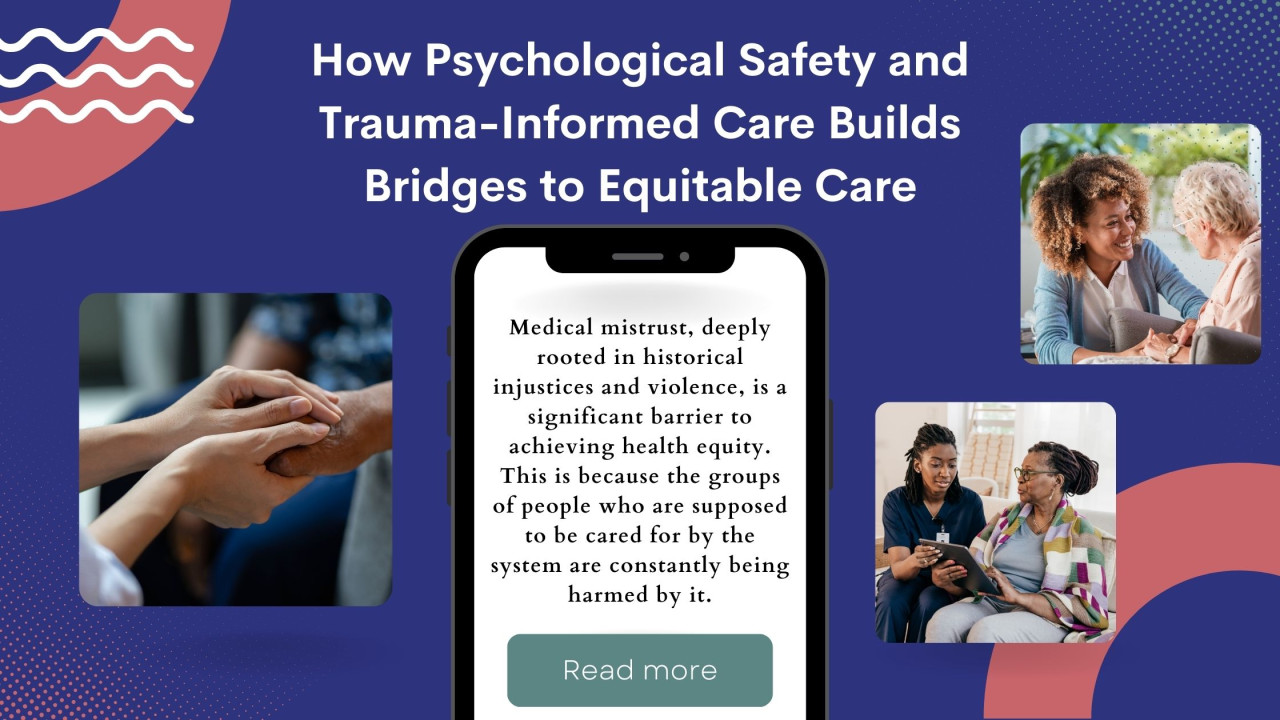(404) 793-0011 | drmaiysha@drmaiysha.com
How Psychological Safety and Trauma-Informed Care Builds Bridges to Equitable Care
Imagine feeling like you can't trust the very system that's supposed to keep you healthy. For many individuals in historically marginalized communities (like myself), this is a stark reality. Medical mistrust, deeply rooted in historical injustices and violence, is a significant barrier to achieving health equity. This is because the groups of people who are supposed to be cared for by the system are constantly being harmed by it. It leads to whole groups of people who don't feel safe and thus seek other means of care and sometimes avoid medical care altogether. This is exactly why psychological safety and trauma-informed care can help bridge the gap, rebuilding trust, and making it more likely that the people who historically have been harmed by the medical system can get the equitable care they deserve.
I. How Psychological Safety Builds Bridges of TrustPsychological safety is like a bridge connecting patients and healthcare providers. It's about creating an environment where individuals from marginalized communities feel seen, safe, heard, and respected. One of the most powerful ways to begin fostering trust and safety is by listening for what's important to the patient. When you actively listen for what's truly important and of concern, you actually allay fears and thus begin to solidify the foundation for trust and cooperative care.
Over time, as patients see that their healthcare providers are making a genuine effort to understand and respect their patients' views, concerns, and cultural practices trust begins the barriers of mistrust begin to lessen.
It's also important to understand that building trust takes time, and so healthcare providers must be patient with the process. Imagine you experience a very traumatic event in your life, and someone expects you to get over it just because they actively listened and acknowledged your concerns one time. That would be preposterous. What is needed to mend centuries of harm is far more than one attempt at connection. This is something that is often forgotten when interacting with people who have experienced trauma. This can lead to re-traumatization (or reactivating the trauma).
II. Emotional Intelligence: A Key to EmpathyThis is why Emotional Intelligence (EI) is an essential skill for healthcare professionals to begin regularly discussing and incorporating into their development. It's not something that is taught in medical school, and it may surprise some, but emotional intelligence is not inherent in all people. However, the benefits are clear. Increased emotional intelligence enables healthcare providers to connect on a deeper level, fostering empathetic communication that leads to trust and understanding. Furthermore, with higher levels of emotional intelligence comes higher levels of emotional flexibility. This enables providers to handle the complexity of responses that can be activated by fears not directly caused by the system or provider but by external events beyond the provider's control. Understanding how to interact in these instances allows the providers to make an even deeper connection and impact when emotional flexibility, compassion, and listening are present.
The bottom line is that medical mistrust in historically harmed communities is a real and deeply entrenched issue. But it's not insurmountable. By prioritizing psychological safety, trauma-informed communication, and emotional intelligence, we can rebuild trust and make healthcare more equitable for those who have historically been left behind.
Imagine a healthcare system where every patient feels heard, valued, and respected, regardless of their background or experiences. This is the goal, and by embracing these practices, we move closer to achieving true health equity, where everyone can access the care they need, trust the system, and where physicians can honor their oath to do no harm as they save lives.
Need a speaker? Learn more about Dr. Maiysha's speaking and trainings. Bring the tools of trauma responsive communication into your organization and create psychological safety in your organization. Increase employee engagement, fulfillment, and retention. Contact us today and schedule a call with Dr. Maiysha to learn how we can improve your workplace culture. https://mindremappingacademy.com/corporate-programs
Stay Informed
When you subscribe to the blog, we will send you an e-mail when there are new updates on the site so you wouldn't miss them.




Comments